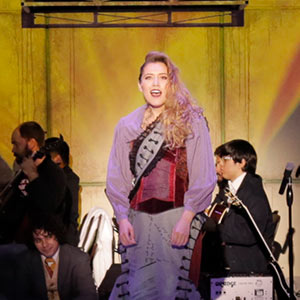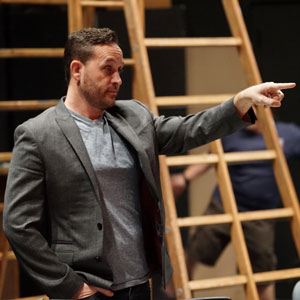Director Critiques Character Roles
— Fullerton College Hornet - Debbie Fleig - Monday, October 17th, 1994"I am a Shakespeare person," said Pamela Richarde, director of Fullerton College's Fall's premiere play, "Hamlet."
According to Richarde, though "Hamlet" is structurally not one of Shakespeare's best plays, "it will be understandable."
Richarde's refers to her favorite scene as the "grave digger scene"-at the end because, in the midst of everything else going on, "it's funny, and it is fun." Her favorite line is "something rotten in the state of Denmark."
"I am a process person, not a product person," saidRicharde, who added it is important to get all the students involved in the production so the result is a good product.
According to Richarde, the preparation for this production included editing the script from a 3 1/2 to a 2 1 /2 hour play which took "about 40 hours."
Below, Richarde, who earned her Master's degree in acting and directing at California State University, Fullerton, recorded her notes on "Hamlet."
My goal in this production is to allow you to experience and share the struggles of a young man who is striving to right a terrible wrong in. the midst of a morally bankrupt world.
Submerged in the romantic world of Denmark in the early 1800's, Hamlet is constantly searching for the truth: his truth and the truth of the world around him. This world is a reflection of the basic struggle of mankind; of each of us as we move through life's problems and the obstacles that confront us.
"Hamlet," as one of Shakespeare's most well produced plays, has taken many forms, and many different "Hamlets" have emerged. Even Shakespeare's text gives us clues to all kinds of Hamlets-as when Claudius speaks of his "turbulent and dangerous lunacy;" or when Ophelia describes him as having a "noble mind, the courtier's, soldier's, scholar's eye, tongue, sword, the glass of fashion and the mould of form;" or yet again,. when Hamlet soliloquizes (finding these qualities in himself) that the "hue of resolution is sicklied o'er with the pale cast of-tbought," (but Hamlet then is certainly unhesitating and resolute enough to plunge his sword-on angry impulse-through the curtain to kill Polonius, and later to leap into Ophelia's grave to wrestle with Laertes because of what he himself, later, calls his "towering passion." Hardly a timid, indecisive man!)
I find that Hamlet is a peace-loving man, who is unwillingly forced to "take arms against a sea of troubles."
The play thunders with the spiritual and emotional conflict of a man. fighting his way to fulfill a pledge to his dead father, a promise that will ultimately be his demise. Hamlet's world has been turned inside out and all the choices he makes lead to but one thing-his removal from a world) in which he no longer belongs.
Seemingly, very much a victim of destiny, I disagree with many of my predecessors, in that I don't believe that Hamlet is a man of indecision.
The truth is that he has made up his mind many times over and it is only through his self-analytical precision an towering imagination that he finds himself living the deed long before he commits it.
Questioning his own motives brings on self-revelation of great complexity that immobilizes him for action. For example, if he truly revenges his father's death and kills Claudius, is he then perhaps as evil as his uncle?
Hamlet could live in any age and his problems would remain valid. I would never go so far as to say Hamlet is every man--he's an extraordinary man. Nevertheless, deep inside all of us there is a part of Hamlet, and we face struggles and complex choices in our lifetimes that are every bit as extraordinary as that of the young Prince.
I hope you enjoy this interpretation of Shakespeare's most famous< and well loved play. I know I've enjoyed the creation of this production.








